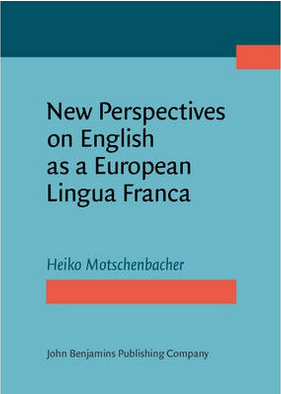
Type the title here
[Book Description]
This volume complements earlier work on English as a lingua franca (ELF) by providing an in-depth study of the phenomenon from a decidedly European perspective. Distancing itself from more traditional approaches to the study of English in Europe (linguistic imperialism and "Euro-English"), the study is theoretically grounded in more recent approaches, namely the ELF paradigm and the postmodernist conceptualisation of "English". Methodologically speaking, the study analyses language use in Eurovision Song Contest press conferences as a community of practice of European salience. The ethnographically based analyses focus on various linguistic levels, thereby producing a comprehensive picture of European ELF as a discursive formation. Various qualitative and quantitative methods are used to shed light on the following aspects: code-choice practices in ELF talk, participants' metalinguistic comments on the use of ELF, complimenting behaviour via ELF and relativisation patterns.On the basis of this data, the concluding section advances discussions revolving around the conceptualisation of ELF in general, the connection between ELF and Europeanness, and implications for European language policies.
[Table of Contents]
Acknowledgements ix
Country codes and other abbreviations xi
Chapter 1 Introduction 1 (4)
Chapter 2 Differing views on the status of 5 (30)
English in Europe
2.1 English in Europe and linguistic 5 (5)
imperialism
2.2 Europe and the World Englishes 10 (10)
paradigm: Euro-English as a linguistic
variety?
2.3 English as a European lingua franca 20 (6)
2.4 "English" in the postmodern age 26 (5)
2.5 New perspectives on English as a 31 (4)
European lingua franca
Chapter 3 Methodological framework 35 (12)
3.1 Studying ELF as community-based 37 (6)
practice
3.2 Corpus compilation: ESC-PC 43 (4)
Chapter 4 Code choice practices and 47 (30)
European ELF talk
4.1 Introduction 47 (1)
4.2 English and European multilingualism 48 (6)
4.3 Code choice at the macro-level 54 (8)
4.4 Micro-switching in ELF talk 62 (12)
4.4.1 Asking for assistance 63 (3)
4.4.2 Creating the Eurovision experience 66 (3)
4.4.3 Greetings 69 (5)
4.5 Conclusions: The embedding of ELF in 74 (3)
European speakers' multilingual
repertoires
Chapter 5 Metalinguistic comments on the 77 (24)
use of English
5.1 Introduction 77 (1)
5.2 Metalanguage 77 (3)
5.3 Comments on code choice at ESC press 80 (6)
conferences
5.4 Comments on English proficiency 86 (3)
5.5 Comments on non-native English accents 89 (8)
5.6 Conclusions: ELF norms superseding 97 (4)
traditional ELT norms
Chapter 6 Compliments in European ELF talk 101(44)
6.1 Introduction 101(1)
6.2 Compliments in Western Anglophone 102(5)
cultures: Form and function
6.3 The sociolinguistic dimension of 107(5)
compliments
6.4 Methodological preliminaries 112(7)
6.5 Compliment frequency in ESC-PC 119(4)
6.6 Structural aspects of compliments in 123(5)
ESC-PC
6.7 Functional aspects of compliments in 128(9)
ESC-PC
6.8 Compliments, gender and sexuality in 137(6)
ESC-PC
6.9 Conclusions: Pragmatic negotiation 143(2)
and identity construction via ELF
Chapter 7 Relativisation patterns in 145(44)
European ELF talk
7.1 Introduction 145(1)
7.2 The structural description of ELF 146(5)
7.3 Relativisation in English: Usage 151(8)
patterns, processing, language typology
7.4 Methodological preliminaries 159(4)
7.5 Relativisers and syntactic function 163(1)
7.6 Relativisers and humanness of 164(8)
antecedent
7.7 Relativisers and LI background 172(3)
7.8 Relativisers and active speaker 175(3)
participation
7.9 Relativisers and European region 178(3)
7.10 Relativisers and EU status 181(1)
7.11 Multivariate analysis 182(4)
7.12 Conclusions: The formal hybridity of 186(3)
European ELF
Chapter 8 Synthesis: The discursive 189(22)
formation of European ELF
8.1 Introduction 189(3)
8.2 Conceptualising ELF 192(6)
8.3 ELF and Europeanness 198(6)
8.4 Implications for European language 204(7)
policies
Chapter 9 Appendix 211(14)
9.1 Transcription conventions: ESC press 211(5)
conferences corpus [ESC-PC]
9.2 List of press conferences in ESC-PC 216(9)
References 225(18)
Index 243

 新书报道
新书报道